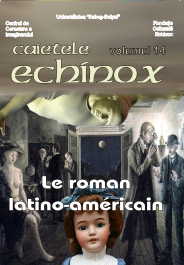Espacio e identidad en las literaturas hispánicas
Space and Identity in Hispanic Literature
Author(s): Olivia PetrescuSubject(s): Literary Texts
Published by: Universitatea Babeş-Bolyai
Keywords: Hispanic Literature; Space; Identity; place representations; centripetal vs. centrifugal movements.
Summary/Abstract: Space has become an irreversible metaphor in the contemporary cultural and critical theories, but at the same time, a meeting point for interdisciplinary studies in the field of Humanities. The first part of this paper, entitled “Culture and Identity”, focuses on aspects of cultural morphology, anthropology, urban geography and philosophy, such as: the diachronic and synchronic meanings of spatiality, the topos creating landscape and language, and the cultural spaces of any place representations. The second part of this study, “Space reflected in literature”, looks at literary examples, defining terms like aesthetic space, systems of places and centripetal or centrifugal movements perceived throughout novels, in order to re-create, on the basis of hermeneutics, the following essential facets of space among Hispanic literature: foundational, regional, modernist, urban, protagonist, animist, fragmented, and post-modern. Even though the textual architecture is different every time, given the distinct periods and authors, the mythic conceptualisation of imagery tends to portray the same artistic reality, which proves that the polyphonic concert of literature is universal, but interpreted through the specific topography of each cultural identity.
Journal: Caietele Echinox
- Issue Year: 2008
- Issue No: 14
- Page Range: 17-35
- Page Count: 19
- Language: Spanish
- Content File-PDF

